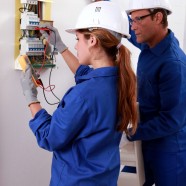Requirements for Electrical Companies in South Florida to Succeed
They may not have to deal with the effects of lake-effect snowstorms, but electrical companies in South Florida have weather issues of their own they have to work through. Like professionals in any area, South Florida electricians must be experts at dealing with the unique problems their environment poses, while maintaining the highest professional standards. Much of South Florida is under renovation and gentrification, and local electricians must be expert at upgrading older wiring and fixtures while still retaining the flavor of older historic buildings and neighborhoods. These professionals must have the training and experience of electricians in any other part of the country, but should also have specialized knowledge of the problems unique to the South Florida area.
Alternate Power Supplies
Between lightning storms, hurricanes, tropical storms, and an aging infrastructure, South Florida is subject to power outages on an increasing basis. Homeowners can be inconvenienced by this, but businesses bear the brunt of a power outage simply by being shut down until the power comes back on. Electrical companies in South Florida have to be experts in backup generators, installing alternate power supplies for homes and businesses. They know the amount of power needed for a bare minimum in a household simply to keep the freezer and lights going, all the way up to a permanent installation that can power a health clinic or emergency community cooling station.
Lightning Protection
Florida has more lightning strikes per square mile than any other state in the country, and the South Florida area gets its fair share of strikes. A lightning bolt hitting a building can cause physical injury, damage to electrical systems and even fire if it’s not dealt with correctly. Air terminals, which used to be called lightning rods, can redirect the power from a lightning bolt to a buried grounding spot away from a building. South Florida electrical companies know how to calculate the correct number of air terminals according to a building’s square footage and height. They are also experts at installing surge suppression for delicate machinery and equipment inside homes and businesses, to prevent expensive data loss and systems failures in the case of an electrical storm in the neighborhood.
Renovation
While the basics of electrical renovation may be similar throughout the country, electrical companies in South Florida have some special considerations to keep in mind when doing their job. The area’s stucco walls, curved shapes, Art Deco flavor, and pastel tones are unique to this part of the country, and it’s a flavor that clients want to preserve when redoing the bones of a building. Local electricians know how to update older wiring that may be corroded by constant contact with salt air, while preserving the look and feel of a Jazz age neighborhood.
New Construction
Electrical companies in this area are more aware of the effects of weather on their construction than in many other parts of the country. They know about the problem of lightning strikes, so they must design air terminals into their wiring plans. Power outages are a fact of life in South Florida, so a backup power supply is a common addition to their plans. The year-round warmth inspires many residents to install elaborate landscaping, so outdoor lighting of all types is a large part of many wiring plans, and ceiling fans are the norm in almost every room in a house. Commercial electricians know to insulate wiring extremely well to help eliminate the problems with salt water corrosion, and they acknowledge that this is a growing area of the state, so they build a job with the next ten years in mind.
Read More5 Residential Wiring Aspects of Home Improvement Projects
Growing families and aging houses combine to create a need for home improvement projects big and small. You may be adding a second story over your attached garage while your neighbor puts on a new roof, but each job has one thing in common: a need for professional electrical work. A lot depends on the size of your project and the age of your house, but a professional electrical contractor will work with you to determine what factors you need to consider before starting on your home improvement project.
#1: New Wiring
If you’re adding a room onto your home, you’ll need to look at your wiring needs before you finalize your plans. You should work with a licensed electrician from the very beginning to determine the amount of power you’ll need running through the room, the number of outlets that are necessary, and any lighting fixtures you might want to install. This should all be part of the original planning stage before any actual work begins.
#2: Upgraded Wiring
Your basic house structure is solid, but you don’t like the old-fashioned moldings and you’re using the room much more than you used to. You may not need an entirely new set of electrical wiring, but an upgrade may be in order. Adding more outlets to a room due to increased entertainment use may put a strain on your system. Older fuse boxes should be replaced by modern circuit breakers, and old wiring should be inspected to make sure it’s still in good condition.
#3: Outlets and Switches
Upgrading a bedroom or dining room may call for installing a dimmer switch to help with the mood as well as controlling electrical costs. High efficiency fixtures combined with dimmer switches can enhance any room while saving money.
Any room which can contain moisture should be equipped with GFCI outlets, including:
- Bathrooms
- Garage
- Workshop
- Backyard
- Kitchen
- Wet bar area of basement
- Hot tub
- Pool area
#4: Lightning Safety
Every home improvement project that includes a new roof should have lightning protection installed in the form of air terminals, also known as lightning rods. These short, unobtrusive poles allow lightning that strikes your home to be harmlessly diverted into a grounding pad away from your house, prevent electrical and fire damage. In addition, a contractor will advise additional protection in the form of surge suppression, to ensure the safe operation of your delicate electronics during sudden power outages due to lightning.
#5: Energy Savings
Instead of replacing old materials with newer versions of the same type, consider changing them completely to more efficient and less expensive energy-saver varieties. All light bulbs can be improved upon by changing them out for LED lighting systems. They run cooler, use less power, and give off a brighter light than older incandescent bulbs. For fluorescent lights in basements, kitchens, and hobby rooms, replacing the ballast in each light for new, high efficiency models can save power and add to a greener lifestyle. Even a simple study of the way your family uses the rooms can reveal wasted electrical power and ways to rearrange your living space to make the most of what you’ve already got going in each area.
When you’re considering a home improvement project, don’t neglect the residential wiring aspects – it will just cost you more in the long term if you do.
Read MoreElectrical Considerations for Renovating a Home
It’s always a smart idea to check and update the wiring in a home when taking on a renovation project. The wiring itself is often less work than actually accessing the works inside walls and flooring, so the best time to work on them is when the bones of the house are already showing. Age is always a factor when it comes to electrical work; if your home is more than 30 years old, it probably has outdated wiring and inadequate power outlets. Keep your family and the next 20 years in mind when deciding on how much electrical work to do while you’re renovating a home.
Planning for the Future
Technology tends to creep, and the total quantity of electronic gadgets in a home generally increases every year. This means a bigger need for electrical outlets in every room in the house. Look at what your family uses right now and double the number of outlets you think you need. Renovating a room or house is a major project, and something you won’t want to do any more often than necessary.
Pay attention to daily tasks your family does now, and those likely to be common in the next ten years or so. These might include:
- Recreational reading
- Crafts and hobbies
- Using a computer
- Gourmet cooking
Each of these activities will have special electrical needs, from extra outlets in a kitchen for the gourmet cook to special corner task lighting for a reading nook. Adding extra outlets is rarely a bad thing, especially in the busiest parts of your house.
Updating for Flexibility and Safety
Convenience is one reason to update your electrical wiring, but safety and flexibility of use can be even more important. Older wiring can fray and become a fire hazard, and homes with fuse boxes or inadequate circuit breakers can be safety hazards, as well. It makes sense to check out all the wiring and electrical installations in a room or portion of the home when taking it apart for renovation. Even if you only decide to upgrade a portion of the room, you’ll have peace of mind knowing the wiring left behind is safe for your family.
One way to save money on a new wiring system when you’re renovating a home is to use the old conduits, if the wiring plan hasn’t changed too much. These major installations have already been shown to be safe and logical ways to deliver power and protect wiring. If you find you can use much of the same older wiring plan, then using the old conduit will save you a significant amount of money on the upgrade.
Use a Professional Electrical Contractor
General contractors and handymen are useful for many types of home improvement project, but when it comes to the wiring planning and execution in your home, you need to use a licensed professional electrician. An experienced professional will sit down with you from the first day to coordinate an electrical plan with your renovation and remodeling ideas. He knows building codes and safety issues having to do with electrical work, and can offer improved and alternate ideas for your upgrade plan. A local professional will also know the local building codes, and can pull permits for doing work on your project. He can work with you on the original blueprint and offer suggestions on how to improve on your electrical system for both safety and economy.
Contact us to discuss your electrical needs when you’re renovating a house.
Read MoreElectrical Wiring: Working With an Experienced Professional
Whether you’re renovating a small business or building an entire subdivision, you may be tempted to hire a general contractor to take care of your electrical needs. A contractor may claim to be less expensive than a licensed electrician, but his lack of knowledge and experience with the small details of electrical work can end up costing you in the long run. An experienced licensed electrician can do the correct electrical wiring job for your building project, economically and safely.
Planning
Restaurant retrofits have different wiring requirements than community centers, but only an experienced professional can know all the details needed for each job. An experienced professional electrician will sit down with you in the early planning stages of a project, blending the electrical wiring plans with all other aspects of construction. He knows about specialized wiring plans, depending on the type of business you will be building. Whether you need extra outlets for kitchen equipment or an area with specialized task lighting for an office, you’ll get a job that fits your need better by using someone with experience.
Cost Savings
The cheapest way to go is not always the most cost-effective method when hiring contractors for your commercial building or renovation project. An experienced licensed electrician can save you money in a number of ways when hired instead of a general contractor. While contractors will have some electrical experience as a result of doing a variety of work, a licensed electrician knows all the small details that make up a efficient and complete electrical wiring job.
- Experienced electricians make fewer mistakes, requiring less reworking on a project
- Years of experience means knowledge of multiple methods of doing a job, including the most cost-effective one for you
- Licensed contractors often have relationships with suppliers, and can get raw materials for the job cheaper
- Contractors with experience know the best way to install an electrical wiring job, cutting down on time and money
Ideas
A general contractor may be perfectly competent to follow your directions and install exactly what you are asking for, but an experienced licensed electrician will know enough about the subject that he can offer suggestions that improve on what you’ve already done. Instead of simply being an employee, an experienced electrician can be a partner in your project, showing you improved ways to install electrical wiring and offering suggestions about outlets, lighting, safety, and security. Specialization creates expertise, and experience gives a professional the experiences to find multiple options for your project.
Legality
Each community has its own building codes, for electricity and electrical wiring as well as for structure. Hiring a licensed professional electrician will ensure you work with someone who knows building codes and has worked within them for years. You’ll avoid work stoppages that come from having to redo sections to bring them up to code, and you’ll sail through city inspections once your project is nearing completion.
Read MoreWhat Does a Lightning Rod Do?
Invented by Benjamin Franklin, lightning rods have been a controversial subject for hundreds of years. Unlike the popular view of them, a lightning rod doesn’t attract lightning to a building. Instead, they simply provide a safe way for electrical energy to reach the ground and avoid damaging a building. The state of Florida offers more lightning strikes per square mile than any other state in the country, so the danger of lightning damage is constant, every day of the year. Preventing damage from a lightning strike by installing a lightning rod system is just smart business.
The Way a Lightning Rod Works
Lightning rods don’t attract lightning, nor do they create it or draw it down from the sky. Lightning will strike in any area it wants, despite anything happening on the ground. When it strikes, lightning can be seen to jump around, moving sideways to find the path of least resistance to the ground. Often the path is a tree, flagpole, house, or other tall object. Whatever is the closest object that will lead low resistance to the ground, that’s where the lightning will strike. When a lightning storm is in the area, there is always a possibility that your business might get hit. With a lightning rod system installed, that hit will conduct the electricity to the ground instead of spreading the energy over your roof and building, causing heat damage or fire.
A Professional Lightning Rod System
A lightning rod is actually a very simple system, and one that can be integrated into your commercial building during construction, or retrofitted afterward. It consists of a terminal, that sits on top of a building, along with a wire that leads from the terminal to the ground, and a buried ground pad where the lightning will eventually end. Air terminals today can be as simple as 18-inch rods not much thicker than a pencil, or even a decorative finial set on the roof and integrated into the safety design. A licensed electrical contractor will be able to inspect a commercial building and advise the size of the lightning rod system that should be installed. A building may need one or many terminals, depending on the size and height of the building, as well as its architectural design.
The Benefits of a Lightning Rod System
The obvious first benefit to having a commercial lightning rod system installed is diverting lightning away from a building and into the ground, avoiding electrical damage and fires. Beyond this, commercial electrical contractors advise installing a lightning rod system for other reasons:
- It can save lives. Dozens of people die from lightning strikes each year, and a surprising number of them are inside buildings when they are hit
- It can save your data. Even if you have no heat damage or fire, a lightning strike right to your building can wipe out your computer system, your POS system, and any other expensive electrical equipment you may run in your business, losing any data stored in their memory
- It can save money. Most insurance companies will offer discounts on a commercial insurance package if a lightning rod system is installed, especially in areas with a high incidence of lightning damage such as Florida
When to Get a Lightning Rod System Installed
A licensed commercial electrical contractor can install a lightning rod system at any stage in the construction process, including retrofitting one years after a building is completed. The best method is to incorporate the lightning rod system into the original electrical wiring design for the building. An integrated system can be more attractive, and can be more easily installed if done so during all the other electrical work in new construction. Your commercial contractor can also add a lightning rod safety system to your existing commercial building of any size. Lightning rods are appropriate for buildings of any height, not just skyscrapers and the tallest buildings in town. If you’ve ever seen photos of lightning striking the ground in the middle of a circle of trees, you know it will hit anywhere it wants. If it aims for your building, the smartest idea is to give it somewhere safe to go.
Read MoreReasons to Use a Licensed Commercial Electrical Service Contractor
Whether you’re renovating a restaurant or building an entire subdivision, hiring a commercial electrical contractor can save you both headaches and money. A licensed commercial electrical contractor will have the knowledge and experience to work with you throughout your entire project. He’ll help you to draw up plans that integrate the electrical system with the rest of the inside of the building, then work to install the wiring and appliances and make sure it’s all up to code. While it’s natural to think of a commercial electrical service when planning new construction, other occasions will occur when it’s natural to hire a licensed professional instead of a general contractor.
Renovation and Remodeling
Many cities in South Florida are enjoying a period of gentrification, going from run-down neighborhoods to upscale eateries and housing. The bones of these old buildings may be solid, but the wiring is likely to be unsafe and unusable. Only someone experienced in dealing with multiple wiring setups can inspect your situation and decide whether it can be repaired or needs to be replaced. In addition, most home remodeling projects call for electrical upgrades due to increased power needs for modern families, updated lighting inside and out, and an upgraded circuit breaker system to replace old fuse boxes.
Lightning Protection
From bars to hospitals, all commercial businesses are run on electricity every day of the year. Florida has more lightning strikes per square mile than any other state in the union, so protection from lightning strikes is crucial for your business. Your commercial electrical system should be connected to a lightning protection system consisting of an air terminal, which used to be called lightning rods, a grounding system, and an upgraded surge protection to make sure your equipment is safe even if lightning does hit your building. A commercial electrical contractor has the experience to create a system that’s unique to your business, retrofitting the equipment within your existing plan.
Standby Generators
Every business has electrical equipment that needs to be in use during the business day, from lights and POS systems in gift boutiques to emergency medical equipment in clinics and hospitals. In south Florida we have a unique combination of circumstances that face us each year, every one of which is likely to cut our power at any time. Lightning strikes, tropical storms, hurricanes, and even accidents with power lines can all create a power outage, leaving your business suddenly without its crucial equipment. A standby generator is the answer to this problem, and commercial electrical contractors can draw up a plan with you, depending on your emergency needs. Whether it’s keeping lights and air conditioning going in a retirement community or making sure an emergency room continues to function, the correct standby generator system can be integrated into the existing electrical system, making sure you’re still up and running when the power fails.
Maintenance and Service
Preventive care is always less expensive than emergency repair, and that applies to electrical systems as much as anything else. A commercial electrician has the training and knowledge to inspect your business and set up a maintenance plan to avoid most electrical problems before they start. He can inspect commercial electrical wiring on a regular basis, change light bulbs before they burn out, do regular maintenance on commercial machinery, and inspect the entire electrical system on every visit.
No matter how much maintenance your commercial electrician does, emergencies will sometimes happen or machinery will break down over time. Having a commercial electrical contractor on call can give you peace of mind, knowing he can repair your existing equipment. You lose money every minute your equipment is shut down, so hiring a commercial expert can save you money over time.
Read More






Recent Comments